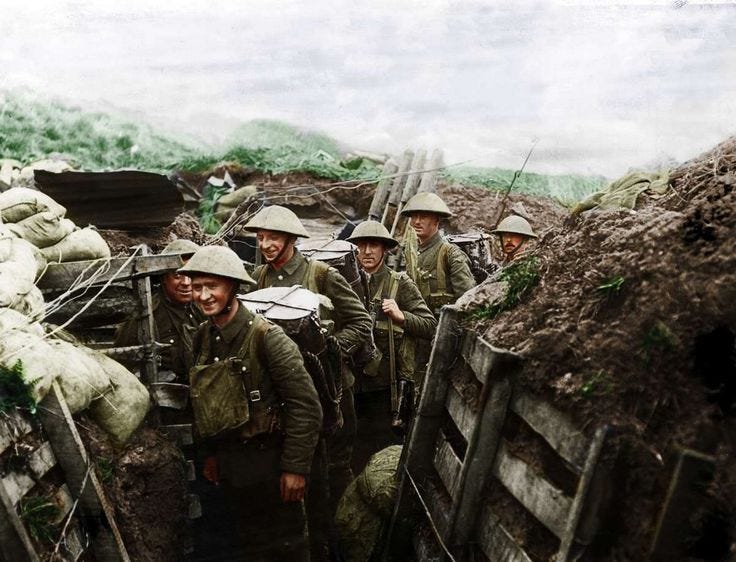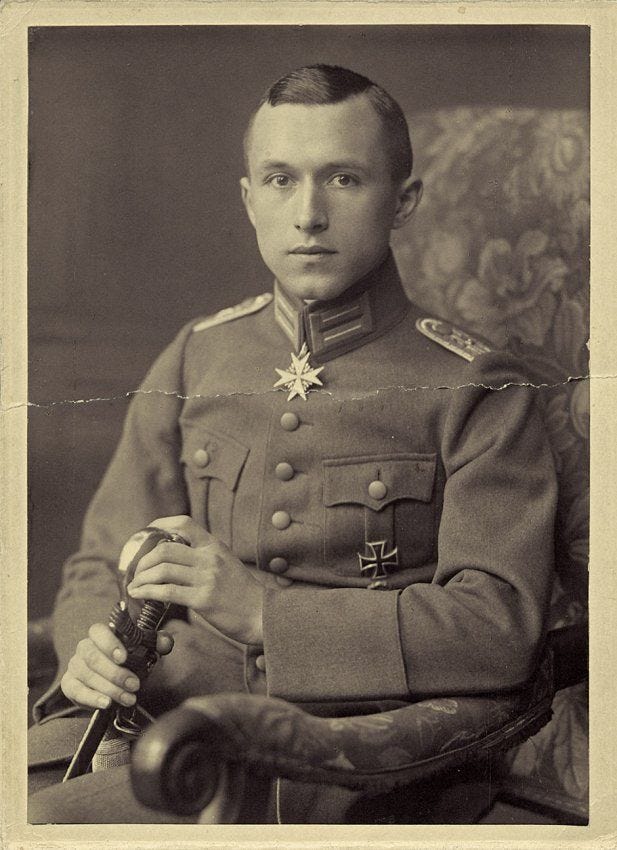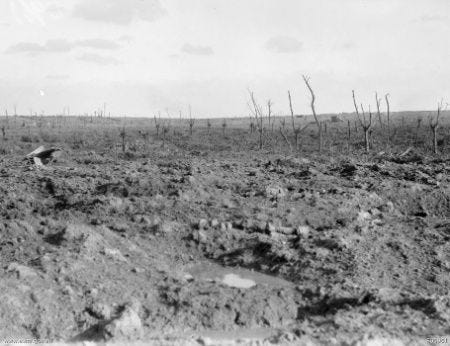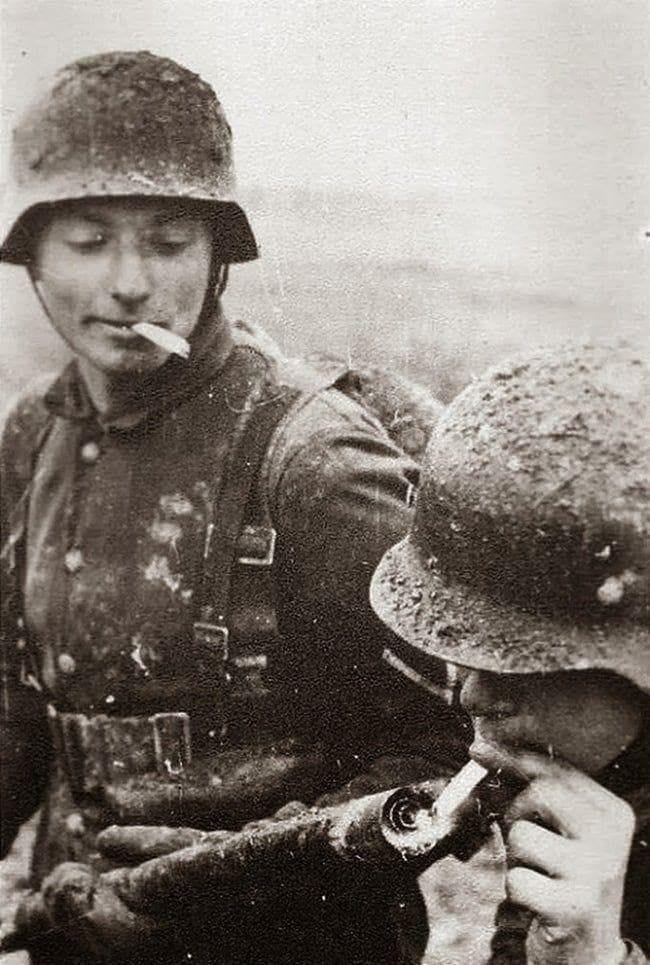Write & Lift is an ethos of personal and spiritual development through conscious physical exertion and practice of the writing craft. Through this effort to strengthen our bodies and minds, we become anti-fragile and self-respecting sovereign individuals. Through this effort, we may stand against untruth and evil and create a new culture of vitality, strength, and virtue.
If this is your first time reading, subscribe here.
Ernst Junger's Crucible
There is another person beside the lone soldier cowering in the foxhole. The shells burst and tear at the surrounding ground. Bodies drop. Screams cut the air. The boy lies in fear, but the man inside him ties his feet to that muddy square yard of hell and fixes him in place. The rationale for individual survival evaporates; for if it didn’t, the boy would sprint back into the trench lines behind and lay in wait for the barrage to stop. He would curl up inside himself like a child holding its blanket. It isn’t that he doesn’t want to, his conscience has been overridden by someone who he’d never met before.
The boy wants to survive, but the man knows that survival—the life and death of one individual man—means nothing anymore. Only two things do; duty, and honor. The daily carnage has wasted no time in revealing an altogether alien view of man’s nature. The steady advancement of bodies that disappear into the churned-up landscape, the boys who look up to the sky and find a dime-sized piece of shrapnel in their skulls, the officers and leaders of men cut at the legs by machine gun fire and die on the bumpy road back to the field hospital, the trench mate who stumbles alone through hellfire to the next rat-maze; who finds his hand and head shaking with such intensity that he can’t even pull from his canteen.
In the machine of death, Ernst Junger found this rare capacity. He saw himself, and his comrades changed. He found the man willing to die for nebulous ideas. And despite being injured over a dozen times, he lived to tell his story.
War Is Hell
The fact is that war, with its daily doses of horror and death, develops its own kind of detached acceptance in people who are able to withstand its pressures.
In Storm of Steel, Junger chronicles his experience of the “Great War”; from his volunteering as a young private in 1915 to becoming a Lieutenant. He would fight for three years before a near-fatal injury to his chest pulled him from the line.
Junger, and the generation of men who followed in the trenches with him, grew up in the shadow of heroes. Images of the sons of European aristocracy riding into combat upon an armored horse, the lancers charging, and the long marches across the Dnieper and Rhine and the glorious thunder of the cannon shot as it echoed across the valley upon your enemies. It is, and always will be, a romantic longing for all young men. To pursue your enemy in combat, to cut him down, and return home a hero. But these are the dreams of boys and these dreams are the first to die in combat.
Every fighting man has some moment of horrified realization. The longing brain switches off. The fight or flight reaction kicks in. You run, you hide, you fight back; you do whatever it takes to survive. Your senses are overloaded. But between the punctuated horror, it becomes impossible to not ask questions. You start to see in yourself the great mystery of courage and inner strength. It is a baptism by fire, an accelerated maturation; the previous self-conception gripped and thrown about like a dog’s chew toy.
What differentiates World War One, what Junger describes, is a slow boiling of tension and violence. This war steamrolled men. It crushed them under horrific new machines. The gates of hell were opened and unleashed. There is no period in human history where this much chaos, this much mechanized and frivolous death, was unleashed.
Junger describes the internal journey through his diary entries; the cautious optimism turning to recognition of futility, chance, and fate. All men walked the same path beside each other—alone.
Boredom: Arriving at the front lines. The water is heating up; the men drink and drill and even play games with their enemies across from them in the trench. They are excited. Ignorant. Fixated on glory. They look at the troops they are relieving and think, “I won’t end up on a stretcher like that poor chap!”
We had come from lecture halls, school desks and factory workbenches, and over the brief weeks of training, we had bonded together into one large and enthusiastic group. Grown up in an age of security, we shared a yearning for danger, for the experience of the extraordinary. We were enraptured by war. We had set out in a rain of flowers, in a drunken atmosphere of blood and roses. Surely the war had to supply us with what we wanted; the great, the overwhelming, the hallowed experience. We thought of it as manly, as action, a merry duelling party on flowered, blood-bedewed meadows. Anything to participate, not to have to stay at home!
…
The horrible was undoubtedly a part of that irresistible attraction that drew us into the war. A long period of law and order, such as our generation had behind it, produces a real craving for the abnormal, a craving that literature stimulates. Among other questions that occupied us was this ; what does it look like when there are dead lying about ? And we never for a moment dreamt that in this war the dead would be left month after month to the mercy of wind and weather, as once the bodies on the gallows were.”
The First Mission: The sensory stimulation of overwhelming. The archaic mind cannot make sense of it all. Excitement, fear, horror, and shock all culminate into one unknowable sensation. You are more alive than you’ve ever been. You enter a new reality that you’ll never be able to escape. You’ll never be able to share this experience in its totality with any civilian or child or spouse.
These moments of nocturnal prowling leave an indelible impression. Eyes and ears are tensed to the maximum, the rustling approach of strange feet in the tall grass in an unutterably menacing thing. Your breath comes in shallow bursts; you have to force yourself to stifle any panting or wheezing. There is a little mechanical click as the safety-catch of your pistol is taken off; the sound cuts straight through your nerves. Your teeth are grinding on the fuse-pin of the hand-grenade. The encounter will be short and murderous. You tremble with two contradictory impulses: the heightened awareness of the huntsmen, and the terror of the quarry. You are a world to yourself, saturated with the appalling aura of the savage landscape.
The Loss of the Self: The “self” dies. You’ve seen friends coughing up blood from gas attacks. You’ve seen fathers cut in half by mortars. You’ve seen hundreds of bones and skulls poking up from the mud. Death becomes a part of you. Fear is so constant you cannot differentiate its biological impulses anymore. You wade into the next day knowing it will likely be your last. If there is wine to be had in the trench, you drink as much as you can. You taste every second of life and count the seldom few blades of grass that spring up from No Man’s Land. You no longer believe you’ll return home, and part of you is ok with that.
Trench fighting is the bloodiest, wildest, most brutal of all ... Of all the war's exciting moments none is so powerful as the meeting of two storm troop leaders between narrow trench walls. There's no mercy there, no going back, the blood speaks from a shrill cry of recognition that tears itself from one's breast like a nightmare.
The Only Choice
What Junger found in himself during combat lay dormant in all men—the ability to stand against the approaching onslaught for an idea; duty and honor. For most of us, we discover, in moments that we least expect, that we are obliged out of moral necessity to put ourselves in harm’s way to uphold our creed. These are the moments when we instinctually transcend the present moment and act out of sacred obligation and necessity.
We stood and fought, not for the sake of a cause, but because it was in our nature to do so.
-Ernst Junger
The dutiful and honorable soldier quickly understands that wars are not fought to inflict harm on a specific individual in the opposing trench. Rather, they are fought and won and lost to preserve the dignity of an idea. As corrupt and misguided as they tend to be, ideas are the foundation of all conflict. The idea of the nation and its people. The idea of individual responsibility. The idea of eternal glory. When the solider meets his enemy there is mutual respect in the understanding that they also fight to preserve an idea. This is the disassociative effect of combat.
Junger writes:
Throughout the war, it was always my endeavour to view my opponent without animus, and to form an opinion of him as a man on the basis of the courage he showed. I would always try and seek him out in combat and kill him, and I expected nothing else from him.
Honor is the glue that binds the dutiful soldier to his task. An honorable man knows his duty and stands up to the task ahead. He is aware that his life, as sacred as they all are under the banner of heaven, is one grain of sand on the beach. When the tide rolls in he knows he will likely be washed out. But he is compelled to his task; for himself, for his comrades, for his nation, as stupid and futile as it may be to the rational mind. The honorable soldier prepares his mind daily to die a “good” death.
While it has been diminished in the comfort and neurosis of our modern times, all men have the capacity to stand at the edge of battle, stare into the abyss, and, with resolution, carry out their task. God willing, this moment isn’t revealed to us in the death and horror of combat. God willing, we can take these lessons from those who have been there before us and find where we can act with duty and honor in our daily lives.
As always, thanks for reading
-Joe









War does what life does (teaches, deadens, breaks, benumbs) but it does it faster and more profoundly. War is the beauty and horror of life compressed into very short periods of experiential time (decades' worth of suffering and heroism and death crunched into a few weeks, or days) and the evil of men compressed into very small pieces of territory (the fears and hatreds and ambitions of a nation squeezed into dozens of square miles). Everyone who has been through war agrees that it changes the survivor.
Duty and honor- all corrupted by globalist bankers who send young men into a meat grinder as they fund both sides….